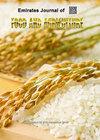用于保鲜易腐水果的壳聚糖/淀粉/玫瑰果薄膜的制备和表征
IF 0.7
4区 农林科学
Q3 AGRONOMY
引用次数: 0
摘要
包装是塑料垃圾的主要污染源。在全球塑料垃圾总量中,大部分是食品包装。生物降解薄膜因其特性的多样性和环保因素,已被广泛应用于各个工业领域。人们越来越关注从可再生来源中寻找具有食品保鲜功能的包装材料。在所使用的聚合物中,淀粉因其丰富的天然资源和可生物降解的特性,以及可再生性和低成本而最受关注。我们建立了一种方法,通过添加淀粉、壳聚糖和洛神花提取物,将易腐水果(黑莓)的保质期从 7 天延长到 14 天。这些生物聚合物分别具有支撑、抗菌和抗氧化特性,可协同增效。通过傅立叶变换红外光谱、热重分析、扫描电镜、接触角和微生物分析证明,壳聚糖和洛神花提取物的使用是实现本研究目标的关键。本研究的重点是在生物膜设计中使用三种尚未一起研究过的元素来保存水果。本文章由计算机程序翻译,如有差异,请以英文原文为准。
Obtention and characterization of chitosan/starch/roselle films for the preservation of perishable fruits
Packaging is the main source of polluting plastic waste. Out of the total volume of plastic waste worldwide, the majority corresponds to food packaging. Biodegradable films have been used in a large number of applications across industrial sectors due to their property versatility and environmental factors. There is a growing interest in the search for packaging materials from renewable sources that prove to be functional for food preservation. Among the polymers used, starch has garnered the most attention due to its abundance in nature and biodegradable quality; it is also renewable and low-cost. A methodology was established to increase the shelf life of perishable fruits (blackberry) from 7 to 14 days by adding starch, chitosan, and roselle extract. These biopolymers synergistically contribute by providing support, antibacterial, and antioxidant properties, respectively. The use of chitosan and roselle extract were key to the achievement of this work’s goals, as proven by FT-IR, TGA, SEM, contact angle, and microbiological analyses. The present work focuses on the use of three elements that have not been studied together in biofilm design to preserve fruits.
求助全文
通过发布文献求助,成功后即可免费获取论文全文。
去求助
来源期刊

Emirates Journal of Food and Agriculture
AGRONOMYFOOD SCIENCE & TECHNOLOGY&nb-FOOD SCIENCE & TECHNOLOGY
CiteScore
1.80
自引率
0.00%
发文量
18
期刊介绍:
The "Emirates Journal of Food and Agriculture [EJFA]" is a unique, peer-reviewed Journal of Food and Agriculture publishing basic and applied research articles in the field of agricultural and food sciences by the College of Food and Agriculture, United Arab Emirates University, United Arab Emirates.
 求助内容:
求助内容: 应助结果提醒方式:
应助结果提醒方式:


